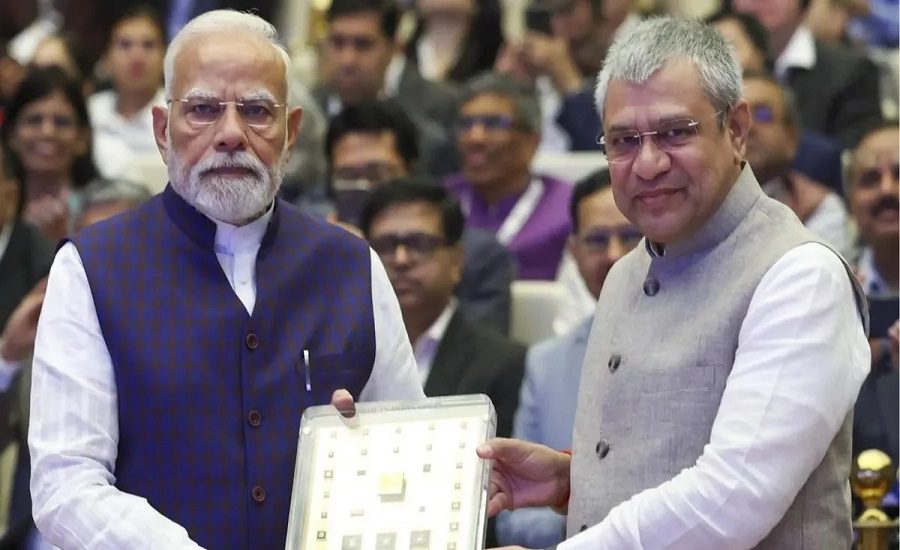Patna/New Delhi: India has achieved a historic breakthrough in semiconductor technology with the launch of ‘Vikram-32’, the country’s first fully indigenous 32-bit microprocessor, developed by ISRO’s Semi-Conductor Laboratory (SCL). This milestone was marked at Semicon India 2025, where Union Electronics & IT Minister Ashwini Vaishnaw handed over the first chip to Prime Minister Narendra Modi.
The event also marked the presentation of the first ‘Made in India’ test chips from four government-approved semiconductor design projects – a clear signal of India’s emergence as a credible player in the global semiconductor value chain.
Vikram-32: A ‘Made in India’ Chip for Space, Defense & Beyond
Developed by ISRO’s Semi-Conductor Laboratory (SCL), Vikram-32 is a 32-bit microprocessor built with high efficiency, large memory handling capability, and designed to withstand harsh space conditions — including extreme temperatures and pressure.
This processor was successfully tested onboard the PSLV-C60 mission, proving its durability in space. But its applications go well beyond that.
Where Can Vikram-32 Be Used?
The Vikram chip’s versatility makes it ideal for a wide range of sectors–
- Space Missions: Navigation, control systems of launch vehicles
- Defense: Strategic and high-precision defense equipment
- Aerospace: Avionics and guidance systems
- Automotive: Smart and secure vehicle technologies
- Energy: High-performance industrial control systems
The processor is capable of handling complex mathematical and logical instructions, crucial for real-time mission-critical operations.
Strategic Power: From Satellites to Submarines
According to ISRO, the Vikram-32 processor not only advances India’s space capabilities but also acts as a force multiplier in defense technologies. It supports robust encryption, real-time response systems, and secure communication modules – all vital for military-grade applications.
Tech Specs: Inside the Vikram Chip
- Architecture: 32-bit
- Efficiency: Optimized for power and performance balance
- Memory: Capable of large memory addressability
- Environment: Designed to function in extreme conditions (space, temperature, radiation)
- Precision: Supports decimal and complex mathematical processing
India’s Semiconductor Mission Gathers Pace
Speaking at Semicon India 2025, Minister Ashwini Vaishnaw announced–
- 5 new semiconductor fabrication units are under construction
- 10 key semiconductor projects have been approved
- ₹1.6 lakh crore total investment committed
- 23 design startups supported under the Design Linked Incentive (DLI) scheme
- Over 280 academic institutions and 72 startups have received advanced research equipment
This progress is a part of the larger India Semiconductor Mission (ISM), which was launched under PM Modi’s vision to make India a semiconductor powerhouse.
“Chips Are the Digital Diamonds” – PM Modi
Prime Minister Narendra Modi, while receiving the Vikram chip at the event, remarked, “Oil was once the black gold of the world; today, chips are the digital diamonds. With Vikram-32, India becomes a credible and emerging force in the global semiconductor value chain.”
Global Attention on India’s Chip Journey
Minister Vaishnaw emphasized that in just 3.5 years, India has shifted from being a chip importer to producing space-grade processors. The successful launch of Vikram-32, he said, is a symbol of trust and technological maturity that the world is now recognizing.
Key Highlights at a Glance
✅ India’s first fully indigenous 32-bit processor Vikram-32 unveiled
✅ Developed by ISRO’s Semi-Conductor Laboratory
✅ Successfully tested in PSLV-C60 space mission
✅ Usable in defense, automotive, aerospace, and energy sectors
✅ Part of India Semiconductor Mission’s goal of self-reliance
✅ PM Modi receives chip at Semicon India 2025
✅ Over ₹1.6 lakh crore investment in semiconductor projects






























